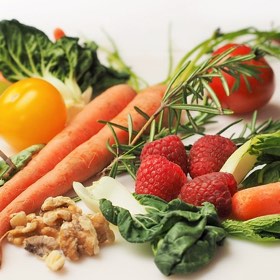Pregnancy & Gut Health – What you need to know
Pregnancy is a special time for parents planning ahead for the new life and family to come. And the moment we meet that little person, we realise we would do pretty much anything to protect them and give them the best start to life possible. But did you know that, when it comes to the health of your beautiful little ones, there is actually quite a lot you can do before they are even born?
You have probably read all about folic acid, vitamin D and omega 3 fats and their role in the development of your growing foetus. But the health of the mother’s intestinal microbiome is also key to the health of her new arrival. How you care for your own digestive system during pregnancy can have a significant effect on the development of your infant’s microbiome.
What is the microbiome? This is the trillions of microbes living in your gastrointestinal system supporting healthy digestion, your metabolism, mental health and immune function. During birth, your infant will be introduced to your own microbiome; which lays down the foundations for their own. While factors such as antibiotic use or the need for a caesarian often cannot be controlled, there are many things a pregnant mother can do to encourage a healthy microbiome for her infant.
Here are tips on how to improve your gut bacteria during pregnancy.
- Eat those vegetables! The microbes in your gut thrive on high fibre diets. They ferment this fibre to spread and support a healthy colon. The recommendation is now SEVEN portions of vegetables and fruit everyday. For reference a portion is
 approximately 80g or one large handful.
approximately 80g or one large handful. - Eat a rainbow everyday. Eating a large range of colourful vegetables and fruit each day can also have a positive impact on microbiome health. Diversity is key!
- The early stages of pregnancy can bring strong cravings for carbohydrates and sweets. While I always encourage mothers to listen to their bodies, it is also important to choose carbohydrates wisely. Refined grains like white bread and pasta and sugary snacks like chocolates, cakes and biscuits, are shown to encourage an imbalance in the microbiome. So try to curb those cravings with healthier snack choices like vegetables, hummus, fruit, nuts, nut butters and wholegrain options.
- It’s also important to eat probiotic foods each day. These foods include natural live yogurts (dairy or other), kefir, water kefir and fermented sauerkraut. These are generally safe in pregnancy but if you are worried or have an immune suppressing condition, it is best to speak with your healthcare professional first.
 Exercising everyday can also have an incredibly positive influence on the microbiome. If you don’t already have an exercise routine in place, then just 30 minutes of brisk walking each day is enough. Look for specialist pregnancy classes or trainers to help you find the best exercise for you.
Exercising everyday can also have an incredibly positive influence on the microbiome. If you don’t already have an exercise routine in place, then just 30 minutes of brisk walking each day is enough. Look for specialist pregnancy classes or trainers to help you find the best exercise for you.- Managing stress is an important factor. Stress is shown to influence the health of the gastrointestinal tract and negatively impact the diversity of the microbiome. Pregnancy can be a stressful period for some, so make sure you give yourself time to unwind and relax. A pregnancy yoga or pilates class can be useful, but a daily relaxation activity can be even more effective such as guided mindful mediation, walks listening to podcasts or a foot soak with a great book.
- Make sure you eliminate alcohol from your diet completely. While some may suggest that a little alcohol during pregnancy is safe, it is shown to disrupt the health of the microbiome.
- As a pregnant women, you will probably already be focussed on reducing caffeine from your daily diet. However, it may be useful to eliminate it entirely as it is also shown to create imbalances in the microbiome.
- If you have ongoing digestive conditions or symptoms, it may be worth investing in a good quality probiotic, particularly in the final trimester as you prepare for birth. These supplements are generally considered safe in pregnancy for most women but, as always, it is best to check with your health professional before taking anything in pregnancy.
Gastrointestinal health is important for everyone. But if you have previously struggled with ongoing digestive or inflammatory conditions, it is absolutely worth giving your intestinal microbiome some attention to support diversity for a happy healthy pregnancy and baby.
For further support see one of our Nutritionist, available online.
REFERENCES
- Bereltsen RJ et al. Probiotic milk consumption in pregnancy and infancy and subsequent childhood allergic diseases. J Allerg Clin Immunol. 2014 ; 133, 165-171.
- Didari T, Mozaffari S, Nikfar S, Abdollahi M. Effectiveness of probiotics in irritable bowel syndrome: Updated systematic review with meta-analysis. World J Gastroenterol 2015 Mar 14;21(10):3072–3084
- Flint HJ. The impact of nutrition on the human microbiome. Nutr Rev 2012 Aug;70 Suppl 1:S10–3.
- Greer F, Sicherer SH, Burks AW., (2008). Effects of Early Nutritional Interventions on the Development of Atopic Disease in Infants and Children: The Role of Maternal Dietary Restriction, Breastfeeding, Timing of Introduction of Complementary Foods, and Hydrolyzed Formulas.
- Gupta, R., et al. (2007). “Time trends in allergic disorders in the UK.” Thorax. v62 (1).
- Gwiazdowska D, Jus K, Jasnowska-Malecka J, Kluczynska K. The impact of polyphenols on Bifidobacterium growth. Acta Biochim Pol 2015;62(4):895–901.
- NHS (20015). “5 a day portion sizes”. https://www.nhs.uk/Livewell/5ADAY/Pages/Portionsizes.aspx
- Round, JL and S. K. Mazmanian,.The gut microbiota shapes intestinal immune responses during health and disease. Nature Reviews Immunology, vol. 9, no. 5, pp. 313–323, 2009.